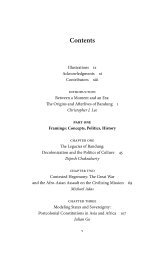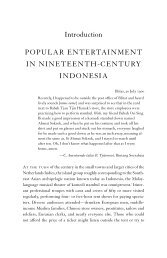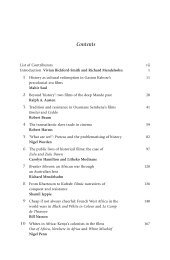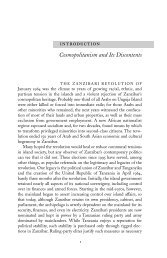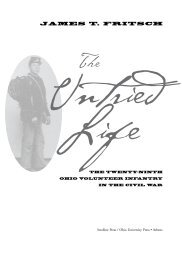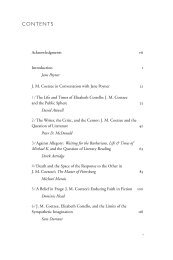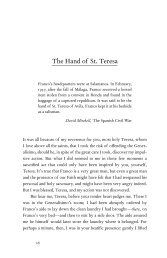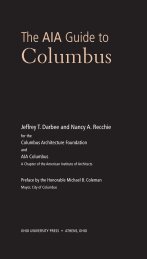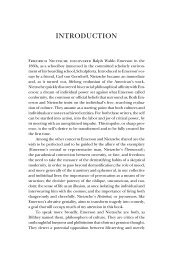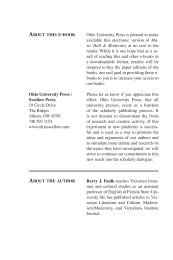Oscar Wilde and Modern Culture - Ohio University Press & Swallow ...
Oscar Wilde and Modern Culture - Ohio University Press & Swallow ...
Oscar Wilde and Modern Culture - Ohio University Press & Swallow ...
You also want an ePaper? Increase the reach of your titles
YUMPU automatically turns print PDFs into web optimized ePapers that Google loves.
of course, deceived Harris about the whole matter,” having used the scenario to<br />
raise sums of £100 on repeated occasions.²₁ To make matters worse, the aggrieved<br />
parties “threatened Harris with proceedings.” Such information troubled Ross<br />
because he had been doing his best to support <strong>Wilde</strong> by administering an allowance<br />
of £150 a year from Constance Holl<strong>and</strong>’s estate.<br />
In any case, Harris had his own reasons for not fulfilling his side of the bargain.<br />
Like <strong>Wilde</strong>, Harris—a habitually extravagant man—was hard up. <strong>Press</strong>ed<br />
for funds, in 1898 Harris sold the Saturday Review, in which he had made space<br />
for some of the most gifted authors of the day. During his four-year editorship,<br />
Harris had brought George Bernard Shaw, H. G. Wells, <strong>and</strong> Max Beerbohm into<br />
the public eye; there, too, he had published <strong>Wilde</strong>’s “A Few Maxims for the<br />
Instruction of the Over-Educated” (1894). Meanwhile, among Harris’s riskier<br />
business ventures was the recent acquisition of a costly hotel in Monte Carlo,<br />
which ended up emptying his pockets. With his finances at a breaking point,<br />
Harris sensed that he had been swindled, <strong>and</strong> he “wrote rather sharply to <strong>Oscar</strong><br />
for having led [him] into this hornets’ nest.”²² He had little faith in how <strong>Wilde</strong><br />
might dispose of any monies he might send to the Hôtel d’Alsace, where <strong>Wilde</strong><br />
had been staying since August. In his memoir about <strong>Wilde</strong>’s last days, Harris’s<br />
secretary, T. H. Bell, recalls that the only solution to <strong>Wilde</strong>’s writer’s block was<br />
to have had a “combination nurse, guardian, <strong>and</strong> amanuensis” to ensure that<br />
<strong>Wilde</strong> completed his part of the collaboration.²³ Above all, in Bell’s view, <strong>Wilde</strong><br />
should “have been kept encouraged <strong>and</strong> from getting drunk too early in the day”<br />
<strong>and</strong> “kept in good humor” (143). (During his exile in France, <strong>Wilde</strong> indulged his<br />
taste for absinthe <strong>and</strong> cognac.)²⁴ Whether fairly or unfairly, all that Harris would<br />
part with before <strong>Wilde</strong>’s death was £25, a fact that <strong>Wilde</strong> repeats in letters that<br />
enumerate his surgeon’s fee (£50), the bill for his consulting physician (£35), <strong>and</strong><br />
his bill at the chemists (£35) (Complete Letters, 1201, 1204). Ross records that in<br />
November 1900, <strong>Wilde</strong>’s hotel expenses stood at £190 (Complete Letters, 1223).<br />
After Mr. <strong>and</strong> Mrs. Daventry enjoyed the best part of a month’s performances,<br />
Harris capitulated to the dem<strong>and</strong>s that <strong>Wilde</strong> made in an urgent letter dated 21<br />
November 1900. Harris dispatched Bell to travel from London to Paris with the<br />
sum that was owing to <strong>Wilde</strong>. Even at this stage, Harris suspected that <strong>Wilde</strong><br />
was feigning illness. (The truth of the situation became known to Harris at the<br />
eleventh hour, for on 27 November Ross wired him about <strong>Wilde</strong>’s perilous condition.)<br />
Bell recalls the instructions that his employer wanted him to follow once<br />
he reached the Hôtel d’Alsace:<br />
Introduction 7



